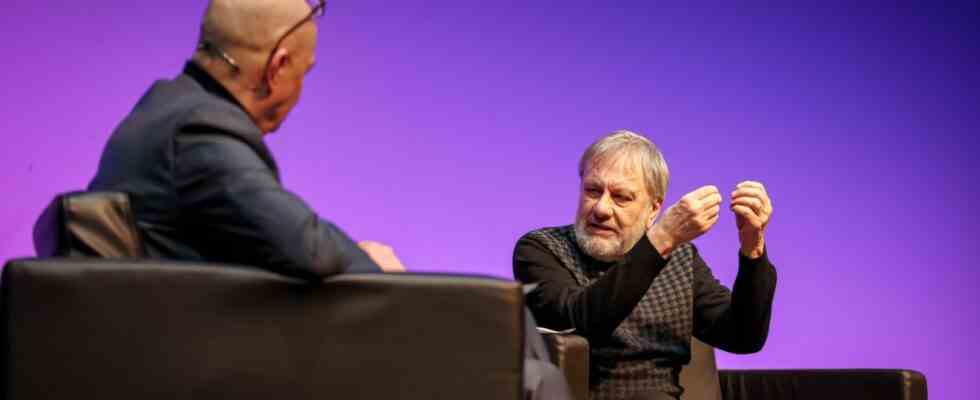The evening in the Residenztheater from the discussion series in cooperation with the SZ “München redet” was sold out. The focus was on the philosopher Slavoj Žižek, who spontaneously developed his thinking out of the moment. The theater program is currently also staging the director Mateja Koležnik, who, like Žižek, comes from Slovenia and combines Sophocles’ “Antigone” with the version created by Žižek, “The Three Lives of Antigone”. But the entertaining and sometimes far-reaching conversation between the philosopher and the SZ editor Andrian Kreye was not about the ancient tragedy, but rather about the contradictions and crises of our time.
Kreye asked his questions in German, which Žižek answered in an amusing mix of German and English, followed by a German translation. He took the questions as an opportunity to stroll along thoughtfully, without aiming for a precise answer. Rather, he continued and developed the complex of questions. He understands German well, but plays with the different languages and hates proverbs like “tomorrow, tomorrow just not today, say all lazy people”. It’s the other way around: “Today, today, just not tomorrow, says everyone who cares.”
The two hours turned into a Tour d’Horizon. It began in native Ljubljana, where there was a skyscraper whose top floor was a favorite place for suicides. It went on to the “internal obscenity” of Yugoslav socialism. For example, homosexuality was forbidden in the military, but the language among the soldiers was full of crude homosexual allusions. Such ironic vulgarity served to relieve the system’s frustration.
The example of Trump shows that ironic imitation is no longer possible because Trump is already a perfect imitation of himself. Various aspects of the cancel culture were addressed, such as how social media creates a kind of private public space, while China simply controls directly. Kreye objected that cancel culture was a more American debate.
He had asked about Ukraine early on, but Žižek evaded the matter by pointing out that everyone knew but that no action followed. For example the Glasgow conference on global warming, where there were lofty speeches but nothing happened afterwards. In connection with sexual identity, which is not simply biological, but the result of a complex psychosocial process, he referred to Sigmund Freud, who had long since analyzed the drama and trauma. “Woke is a fake awake” because in the end one is in a comfortable position that divides society, very much in the interest of capitalism.
Thinkers with many senses: Slavoj Žižek.
(Photo: Leonhard Simon)
The mental wandering became strictly philosophical: fiction influences reality creatively, Georg Friedrich Hegel is the most open thinker today because he said nothing about the future. On the other hand, Karl Marx still knew a goal-oriented projection into the future. Žižek pointed to ideology in everyday rituals, for example using different toilet models in Germany, France and the USA. And he emphasized the courage of the hopeless, which, like in the film “Independence Day”, in the midst of the catastrophes and dystopias, suddenly made possible a utopia of the peaceful coming together of all.
After two hours, the audience in the Residenztheater gave a big round of applause.
(Photo: Leonhard Simon)
After finally characterizing Putin with bitter irony as a kind of soft fascist who is bringing out the old patterns again, Žižek finally said that on the “basis of objective social democracy” “military-like” approaches could be used for the current major crises such as the Ukraine war, global warming, and the energy crisis become necessary. With great applause for this entertaining evening, Slavoj Žižek promised to come back to continue the conversation. But then you have to work more strictly and concisely.

